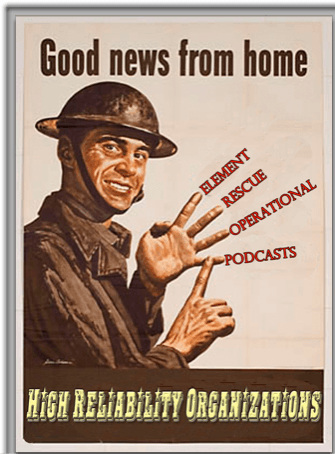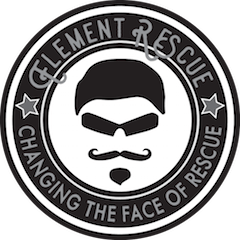We have been involved with HRO methodology for just over the past decade. We have implemented HRO into every aspect of our programs of instruction (POI), TTP development and implementation, and organizational management. HRO integration produces quantifiable capabilities that enhance not only your reliability but your resilience when operating within high threat environments. Just like Boyd’s Cycle (OODA loop) principles, HRO’s can be studied from a “basic” level all the way across the spectrum into advanced theory.
This three part series with Dr. van Stralen dives into many realms of HRO, which are rarely discussed or understood. This Podcast was recorded on Skype while Daved was in Paris on vacation, so there are certain points where words get slightly garbled. Bare with us on that.
Below is a brief overview of how we have implemented HRO into our training methodology.
Five Components of the HRO Philosophy
The first three provide upstream detection of issues (friction points), while the last two enhance your capability at regaining the initiative.
- Pre-Occupation with Failure
- Reluctance to Simplify
- Sensitivity to Operations
- Commitment to Resilience
- Deference to Expertise
“The five principles of High Reliability Organizations (HRO) provide a simple, yet effective filtering tool utilized throughout our curriculum. By utilizing this methodology throughout the developmental process, it allows the end user a real-time quality assurance capability enhancing reliability and resilience, significantly decreasing unwanted, unanticipated, and unexplainable variances in performance. This specialty of rescue / access emphasizes the foundational knowledge, or epistemology (acquaintance, competence, and proposition) combined with the inherent application of physics (manipulation of simple machines) to allow the end-user a healthy response to unhealthy or dangerous situations. This understanding allows the rescue end user the capability of dynamically operating within chaos (emergence); conducting interactive, real-time risk assessment shifting probability to the left or right based on response to unpredicted variables inside complex-adaptive systems.” (Element Rescue / Rescue Craft Operational / Dynamic Rescue Manual)
We have broken out the five principles of HRO...then filtered our entire curriculum through them. We are not going to post these for obvious reasons, but feel free to contact us to discuss what it looks like. The following are a few useful quotes about HRO and its application that will help put this methodology into focus while listening to the 3-part Podcast. Many of the following items are discussed throughout the Podcast.
- Challenges to HRO’s
- Hyper-complexity
- Tight Coupling
- Extreme Hierarchical Differentiation
- Multiple Decision Makers in a Complex Communication Network
- Working Under Compressed Time Constraints
- Need for Frequent, Immediate Feedback
- High Degree of Accountability
“Reliability depends on the lack of unwanted, unanticipated, and unexplainable variances in performance.”
Eric Hollnagel, 1993, p.51
1. “The major determinant of reliability in an organization is not how greatly it values reliability or safety per se over other organizational values, but rather how greatly it disvalues the mis-specification, mis-estimation, and misunderstanding of things;
2. All else being equal, the more things that more members of an organization care about mis-specifying, mis-estimating, and misunderstanding, the higher the level of reliability that organization can hope to attain”
Paul Schulman, 1997
Strive for an...
Informed culture- a culture that creates and sustains intelligent wariness. Informed cultures result from four coexisting subcultures:
- Reporting culture: What gets reported when people make errors or experience near misses?
- Just culture: How do people apportion blame when something goes wrong?
- Flexible culture: How readily can people adapt to sudden and radical increments in pressure, pacing, and intensity?
- Learning culture: How adequately can people convert the lessons that they have learned into reconfigurations of assumptions, frameworks, and action?
“You STOP concentrating on those things that confirm your hunches, are pleasant, feel certain, seem factual, are explicit, and that others agree on.
You START concentrating on things that disconfirm, are unpleasant, feel uncertain, seem possible, are implicit, and are contested.”
Weick/Sutcliffe
“To be mindful is to see more clearly, not to think harder and longer” - Weick /Sutcliffe
See where your model didn’t work, or see indicators you missed that signaled expectations weren’t being
- Fulfilled (failure)
- Strip away labels, stereotypes that conceal differences among details (simplification)
- Focus on what is happening here and now (operations)
- See new uses for old resources through improvisation and making do (resilience)
- Discover people who understand a situation better than you do and defer to them (expertise)


